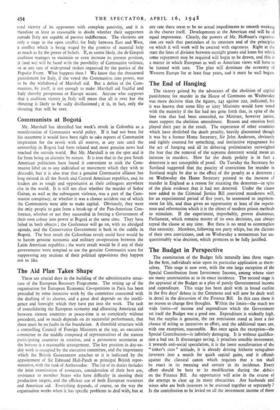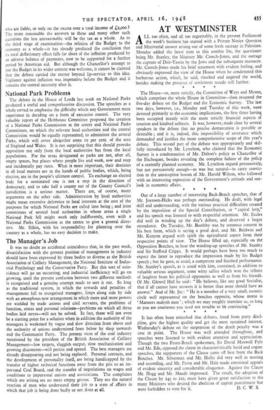The Budget in Perspective
The examination of the Budget falls naturally into three stages. In the first, individuals seize upon its particular application to them- selves. This stage is now over, with the one large exception of the Special Contribution from Investment Income, among whose vices are many uncertainties as to its exact incidence. The second stage is the appraisal of the Budget as a plan of purely Governmental income and expenditure. This stage has been dealt with in broad outline in the five days' debate in the Commons and will now be dealt with in detail in the discussion of the Finance Bill. In this case there is no reason to change first Thoughts. Within the limits—the much too wide limits—of income and expenditure which the Government set itself the Budget was a good one. Expenditure is wickedly high, but the surplus is genuine, the tax remissions stand at least a fair chance of acting as incentives to effort, and the additional taxes are, with one exception, reasonable. But once again the exception—the Special Contribution—is infinitely damaging. It is without qualifica- tion a bad tax. It discourages saving, it penalises sensible investment, it rewards anti-social speculation, it is the latest manifestation of the " tinker's cuss " attitude, it is already driving hitherto scrupulous investors into a search for quick capital gains, and it offends against the classical canon which requires that a tax shall be exact in its meaning and certain in its incidence. Every effort should be bent to its modification during the debate on the Finance Bill. An opportunity will arise in the course of the attempt to clear up its many obscurities. Are husbands and wives who are both investors to be assessed together or separately ? Is the contribution to be levied on all the investment income of those who are liable, or only on the excess over a total income of L2,000 ? The more reasonable the answers to these and many other such questions the less unreasonable will be the tax as a whole. As to the third stage of examination—the relation of the Budget to the economy as a whole—it has already produced the conclusion that its total deflationary effect falls far short of the inflation produced by an adverse balance of payments, now to be supported for a further period by American aid. But although the Chancellor's attempt to put the Budget in its wider context was welcome, it cannot be claimed that the debate carried the matter beyond lip-service to this idea. Vigilance against inflation was imperative before the Budget and it remains the central necessity after it.































 Previous page
Previous page